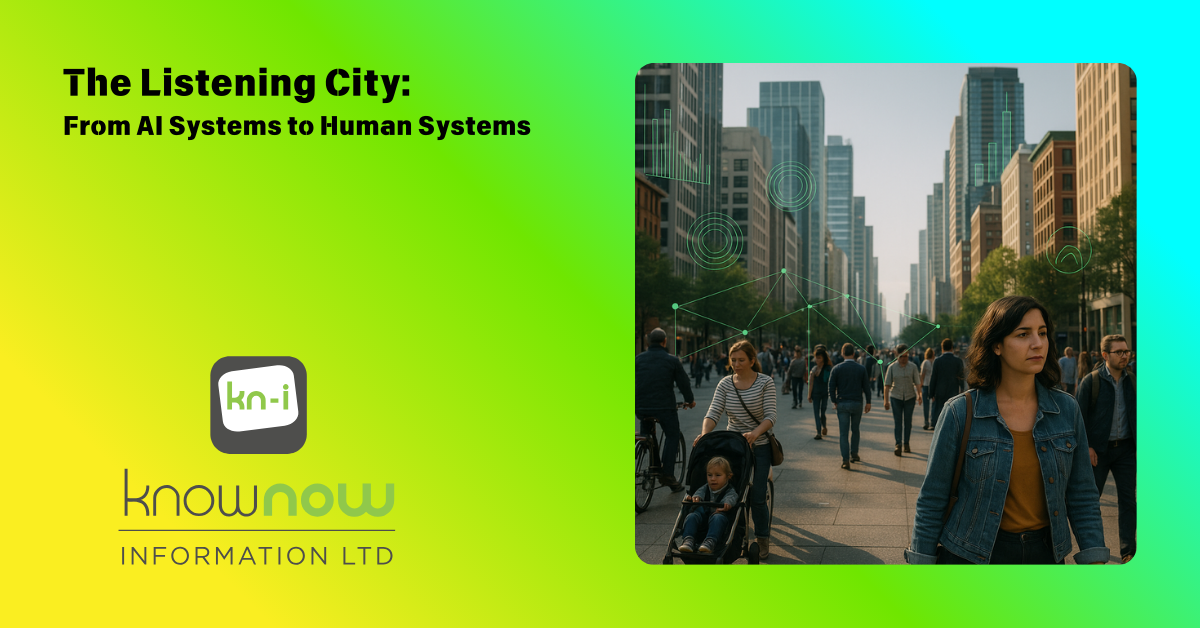In the rush to build smart cities, we risk forgetting the smartest insight of all: the citizens are the city. Over the course of this blog series, we’ve argued that the heart of a successful smart city is not its infrastructure, sensors, or AI dashboards – it is its people. Now, we want to push that idea further.
What if the city didn’t just serve you? What if it understood you?
From Data to Empathy
Our first post challenged the industry’s definition of a smart city, arguing that no city is truly smart until it wins the hearts, minds and wallets of its citizens. We called for a humanised approach where citizens are central, where technology is only adopted if it demonstrably improves lives.
Then we examined the structural blockages: siloed departments, incompatible data platforms, and a procurement culture that often kills innovation before it begins. We called for outcome-driven thinking and better cross-organisational design.
Our third post offered a quiet solution: AI as the invisible enabler of better living. Not a silver bullet, but a subtle system that removes friction, streamlines interaction, and learns to adapt. The best government services are often the ones you never notice.
But these ideas are not isolated. They echo a wider movement, seen globally in places like Expo City Dubai, where the city itself is reimagined as a testbed for empathy.
Empathy at Scale: Learning from Expo City
Dr. Amy Hochadel recently shared her experience with Expo City Dubai: a city that treats data as empathy, where urban systems are built not to monitor people, but to listen to them.
With 200,000+ live data points and a whole-city testbed, Expo City is testing what it means to run a city that doesn’t just gather data, but responds to it, in real time, in context, and in service of its residents. Not everyone will raise a service ticket. But shifts in behaviour, quiet patterns in footfall or ambient noise, tell their own story.
This is not about surveillance. It’s attentiveness.
UK Smart Cities: Behind in Vision, Rich in Opportunity
At KnowNow, we’ve worked with UK councils, universities and developers who deeply care about getting this right. But we’re often stuck in old systems.
The challenge isn’t a lack of innovation. It’s a lack of absorption. Councils are encouraged to be “innovative” but left with procurement rules designed for buying bins, not building adaptive systems.
We believe the UK can do what Dubai is doing, in our own way. It begins by treating our cities not as showcases for tech, but as systems that can learn. That means:
-
Embedding testbeds into real life: not just pilots in isolation, but live, city-wide trials that include policy, governance, and people.
-
Letting citizens co-design services: using tools that turn feedback into interaction, not just reports.
-
Adopting AI as the quiet fix: reducing effort, increasing empathy, enabling responsiveness.
-
Reforming procurement: rewarding outcomes, not just contracts.
The Listening City
The future isn’t the perfect city. It’s the listening city.
A listening city doesn’t wait for citizens to shout to be heard. It learns from patterns. It notices when something shifts. It makes services disappear when they’re not needed and reappear when they are. It uses data to understand, not just to optimise.
Cities like these won’t just be more efficient. They’ll be more human.
And the cities that lead this transition? They won’t just be smarter.
They’ll be the ones that learn.

0 Comments